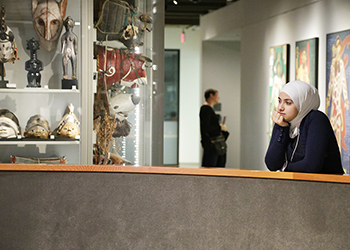The Inclusion of Migrants and Refugees

“Whoever works in the field of Culture believes in its power to transform lives and contribute towards social inclusion and cohesion, fostering knowledge, dialogue, tolerance and respect. For this reason, whoever works in this sector cannot imagine the way that such an inclusion process might happen without the involvement of Culture.” In the introduction to the book “The Inclusion of Migrants and Refugees: the role of cultural organisations, the coordinating editor, Maria Vlachou, summarises the increasingly urgent concerns of the many cultural sector professionals who wish to make their contributions to the inclusion of migrants and refugees but who neither know how to do so nor just where to start. The publication of this work is designed to meet this need and serve as a base for developing reflections and more sustainable practices for cultural organisations. The first section of the book brings together ten interview that convey the witness accounts of professionals working for cultural organisations with a great deal of experience in this field: Counterpoints Arts (United Kingdom), Roskilde Libraries (Denmark), NOESIS – Salonica Centre of Science and Museum of Technology (Greece), Liverpool National Museum (United Kingdom), Rotterdam Museum (Netherlands), Museum Project on Migration (United Kingdom) and the Institute of Canadian Citizenship (Canada).
In Portugal, there is also no shortage of examples of best practices: cases include the project “RefugiActo: the voice and echo of refugees through theatre”, which emerged in 2004 within the context of Portuguese language classes run by the Portuguese Council for Refugees and has received support from the Calouste Gulbenkian Foundation and its PARTIS program – Artistic Practices for Social Inclusion. This is an amateur theatre group where they share emotions, knowledge and experiences and involving people from literally all over the world. Among other references emerging from this book are cases such as the TODOS Festival – Paths of Cultures, that has worked to develop intercultural exchanges in Lisbon through recourse to the arts, valuing contemporary and community based approaches, and the work of the Renewing Mouraria Association, involved in the international project for the Encyclopaedia of Migrants: the intimate and individual side to stories of migration. This “encyclopaedia”, which contains “non-scientific knowledge and learning”, was published in hard and digital formats in French, Spanish, Portuguese and English and tells the accounts of 400 migrants representing 103 countries and 74 different languages.
As highlighted in his interview Almir Koldzic, co-director of the Counterpoints Arts organisation: “Diversity should not be seen as some burden or deficit but rather as a progressive strength that we commit towards in order to make our societies stronger.” This publication also contains a manual with the recommendations produced by the German Museum Association and translated into Portuguese alongside the contacts of organisations belonging to the government, the cultural sector, the social sector and to academia alongside bibliographic references and other useful information to assist those professionals seeking whether to design projects in this area and better construct their ideas or to find inspiration from establishing connections and partnerships with other entities. This publication is available for consultation in Portuguese and English at acessocultura.org.
